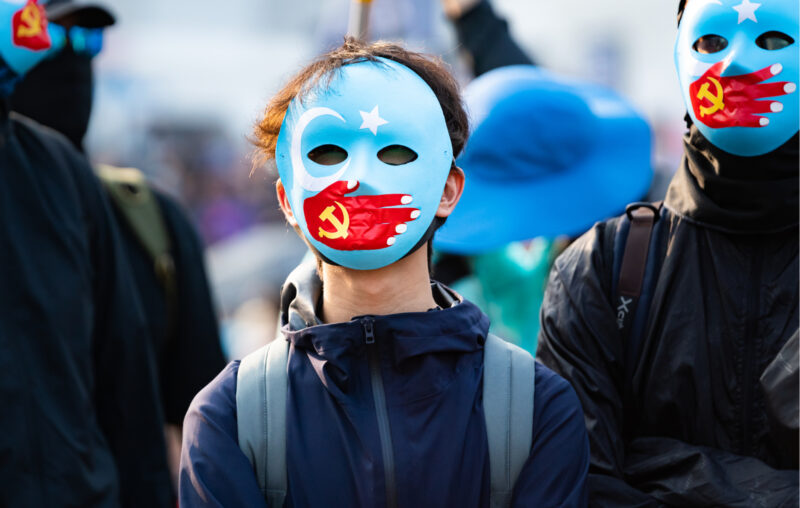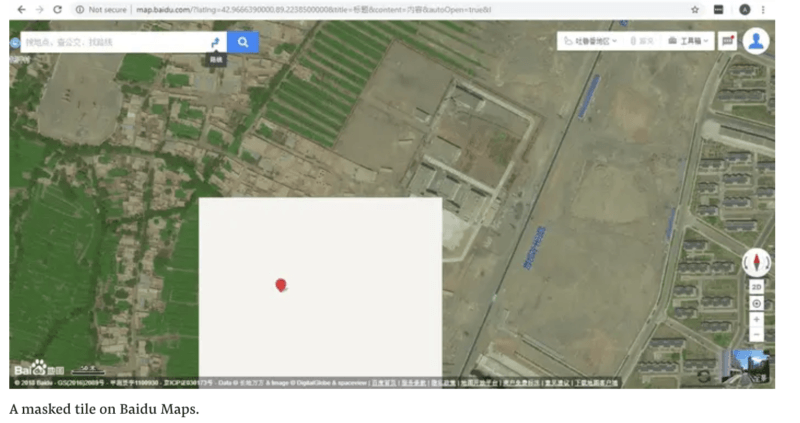China Attempts to Silence Western Companies On Xinjiang

It’s been a long-established fact that China has been engaging in egregious human rights violations, particularly with the internment of what could be over a million Uyghur Muslims in the province of Xinjiang. AIER’s Richard Ebeling writes on the matter when he explains
“The Uyghurs, like the Tibetans, and other minority groups in China, have been the victims of Chinese political and ethnic imperialism. The Chinese government has attempted to assure the political unification and integration of, especially, Tibet and Xinjiang by a policy of ethnic and cultural “sterilization.” For decades, the Chinese authorities in Beijing have instigated Han Chinese population migrations to these two areas to “dilute” and reduce to a demographic minority the Uyghur and Tibetan peoples within their own lands.”
The context surrounding the subjugation of Xinjiang is that it is home to terrorist activity, most likely because the province itself is a recent conquest made by the Chinese and not a longstanding member of the Chinese nation. In an attempt to quell political unrest, the Chinese Communist Party has built a vast and oppressive surveillance state in the region while interning as well as torturing what could be over a million Uyghurs, the main ethnic group in the region. This is easily one of the greatest modern atrocities committed by a modernized country. China has repeatedly denied poor treatment of the Uyghur people much like it denies wrongdoing on every other human rights abuse.
Breaking News
This week numerous headlines such as this one from NBC News report that a sudden and coordinated boycott effort against Western fashion brands has sprung up across China. Brands such as Burberry, Adidas, Nike, H&M, Calvin Klein, Tommy Hilfiger, New Balance, Zara, and many others were targeted by Chinese state-controlled media for their statements on Xinjiang, some made years ago.
The Hollywood Reporter notes that these attacks are in response to a coordinated condemnation of human rights abuses in Xinjiang issued by 27 nations such as the United States, Canada, and the European Union. They write
“The ruling Communist Party criticized H&M for saying in March 2020 it would stop buying cotton from the northwestern Chinese region. The Swedish retailer joined other brands in expressing concern about reports of forced labor there.”
The CCP and its various state-sponsored groups have been issuing statements such as the following,
“Spreading lies to boycott Xinjiang while wanting to make money in China? Wishful thinking,” the Youth League said…
“How can H&M eat Chinese rice and then smash China’s pot?” state television said in a commentary Wednesday.”
It shouldn’t be too difficult to assume that from forced detainment and torture comes slave labor. According to the Business and Human Rights Center,
“In March 2020, the Australian Strategic Policy Institute (ASPI) published a report Uyghurs for sale: ‘Re-education’, forced labour and surveillance beyond Xinjiang, which identified 83 foreign and Chinese companies as allegedly directly or indirectly benefiting from the use of Uyghur workers outside Xinjiang through potentially abusive labour transfer programs.
ASPI estimates at least 80,000 Uyghurs were transferred out of Xinjiang and assigned to factories in a range of supply chains including electronics, textiles, and automotives under a central government policy known as ‘Xinjiang Aid’. The report identified 27 factories in nine Chinese provinces that are using Uyghur labour transferred from Xinjiang since 2017.”
In particular, Xinjiang is one of the largest cotton exporters in the world and that cotton has been linked to slave labor by the US Government, which halted all imports in January of 2021.
This week Chinese state media has begun an aggressive campaign to mobilize its population to conduct what is essentially economic warfare against the West by boycotting its companies. CNN Style reports
“For enterprises that touch the bottom line of our country, the response is very clear: don’t buy!” China Central Television said on its social media account.
Many users also joined the calls for a boycott, urging local retailers to carry domestic stock instead.
The hashtag #ISupportXJCotton — created by the state-owned People’s Daily — generated more than 3 million ‘likes’ as of Friday on the Chinese social media platform Weibo.
They also report that Chinese celebrities have also begun a coordinated effort to drop their sponsorships with Western brands, likely ordered by the CCP, when they write
However, in a striking move this week, more than 30 Chinese celebrities have ended their promotional partnerships or said they would cut ties with brands they accused of “smearing” cotton produced in Xinjiang, including H&M, Nike, Adidas, Puma and Calvin Klein…
The scale of the celebrity exodus is unprecedented — so much so that on Chinese social media, March 25 has been dubbed “contract termination day” among China’s entertainment circles.”
NBC News notes that this week a lawmaker in Hong Kong attacked Burberry on Twitter with the following tweet:

Of course, these “unfounded allegations” of human rights abuses are not only consistent with Communist China’s long history of terror, with an estimated 45 million people killed in just four years during the Great Leap Forward, but such allegations have been leveled from countries around the world for years now.
In fact, the internment camps that China claims do not exist, but at the same time say are necessary to prevent terrorism, can be spotted from space with satellites. In a particularly jarring analysis, Buzzfeed News shares a photo of what seems to be a prison in Xinjiang that has been blanked out on Baidu Maps, a Chinese internet service provider.

What This All Means
AIER has published a three-part series detailing nuanced issues pertaining to China. In part one I outlined the sophisticated foreign policy tools that China employs against the West. This is a classic move in the Chinese toolbox which is to employ economic and cultural warfare to defend its authoritarian practices against human rights scrutiny. The CCP has near-total control over its population, which is how it has managed to not only keep its people silent on Xinjiang but weaponize them against the West and its human rights principles.
China knows that its massive consumer economy is crucial for market-based Western societies to access and it knows that a massive boycott will pressure the West in allowing it to continue its human rights abuses. A recent roundtable on China organized by the Hoover Institution noted that as recently as President Biden’s election, Chinese officials have been urging US companies to lobby the Biden administration to be softer on China if they wish to do business in China. This is the game that the Chinese play, using the West’s greatest power, freedom and markets, against itself. This is actually a principle in the ancient Chinese warfare doctrine known as the 36 Stratagems. This particular strategy could be labeled 借刀殺人, Jiè dāo shā rén, or “Kill With a Borrowed Sword” which entails using your opponent’s strength against them.
The attacks against Western fashion brands this week are a deliberate and orchestrated effort by the Chinese Communist Party to protect their human rights abuses in Xinjiang in response to recent Western sanctions for slavery in the region. They understand full well that this attack is a brilliant leveraging of the West’s greatest strength, a free and market-based society, against itself by forcing companies to choose between profit and survival over the rights of people they may never be able to save. Now more than ever would be the time for the free world to find solidarity with itself and pursue greater strategic, economic, as well as cultural relations with one another in response to what is clearly an existential threat to the future of human liberty.










